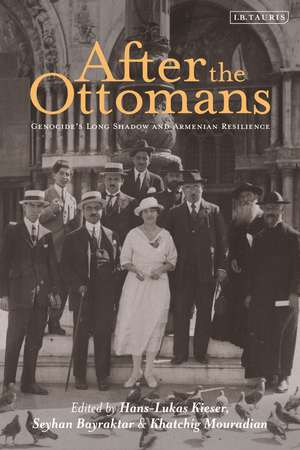After the Ottomans: Genocide's Long Shadow and Armenian Resilience
Editat de Hans-Lukas Kieser, Khatchig Mouradian, Seyhan Bayraktaren Limba Engleză Hardback – 9 aug 2023
Preț: 541.38 lei
Preț vechi: 629.51 lei
-14% Nou
Puncte Express: 812
Preț estimativ în valută:
103.61€ • 107.77$ • 85.53£
103.61€ • 107.77$ • 85.53£
Carte tipărită la comandă
Livrare economică 14-28 aprilie
Preluare comenzi: 021 569.72.76
Specificații
ISBN-13: 9781788312769
ISBN-10: 1788312767
Pagini: 304
Dimensiuni: 156 x 234 mm
Greutate: 0.6 kg
Editura: Bloomsbury Publishing
Colecția I.B.Tauris
Locul publicării:London, United Kingdom
ISBN-10: 1788312767
Pagini: 304
Dimensiuni: 156 x 234 mm
Greutate: 0.6 kg
Editura: Bloomsbury Publishing
Colecția I.B.Tauris
Locul publicării:London, United Kingdom
Caracteristici
Presents range of case studies on the aftermath of the Armenian Genocide inside and outside modern-day turkey
Notă biografică
Hans-Lukas Kieser is a historian at the University of Newcastle, Australia, and the University of Zurich, Switzerland. Seyhan Bayraktar is a political scientist and PhD-coordinator at the Graduate School of the University of Zurich, Switzerland. Khatchig Mouradian is a lecturer in Middle Eastern, South Asian, and African Studies at Columbia University, USA and the Armenian and Georgian Area Specialist at the Library of Congress.
Cuprins
List of ContributorsIntroduction (SB, HLK, KM)Part I. Dismantling Silences and Doctrines, Telling Truths1. Dismantling Silence: Remembrance and Action under the Genocide's Long Shadow (Khatchig Mouradian)2. Return of the Suppressed: Atatürk's History Doctrine, Islam and the Armenian Genocide (Hans-Lukas Kieser)3. The past, the present and the politics of memory (Seyhan Bayraktar)Part II. Armenian Writing as Agency4. The Armenian Writers Faced with Writing about the Medz Yeghern (Valentina Calzolari)5. Roupen Der Minasian: Three Kinds of Agency (Elke Hartmann) 6. Hrant Dink and Turkey's Armenian Problem (Toros Korkmaz)Part III. Being Armenian in Turkey7. Auto-da-fe in Istanbul: Nationalist Turkey's first denialist crisis (1935) (Emmanuel Szurek)8. Being Armenian in Turkey: The Story of the Papazyan Family (Öykü Gürpinar) 9. A repatriation that never took place: The Soviet Armenian call for immigration of 1946 and its impact in Turkey (Talin Suciyan)10.Genocide Commemorations in Turkey: A Social Identity Perspective(Nanore Barsoumian)Afterword (Raymond Kévorkian)Index
Recenzii
'After the Ottomans: Genocide's Long Shadow and Armenian Resilience' is a highly relevant book whose publication in the year of the Republic of Turkey's centenary could not have been more timely. The contributions are a reminder against genocide silence and denial, giving a voice to the all too often marginalized, showing that Armenians were not only victims of the genocide, but also survivors and agents of their history, who are in search of justice.
In emphasizing the myriad forms of Armenian agency over the course of the past century, this volume explores an underappreciated aspect of the politics, history, and legacies of the Armenian Genocide. Guided by an eminent trio of editors, this volume productively brings together social science and humanities perspectives. In its breadth and sustained emphasis on Armenian resilience, it is a valuable companion to Richard Hovannisian's essential series of edited volumes on the Armenian Genocide.
In emphasizing the myriad forms of Armenian agency over the course of the past century, this volume explores an underappreciated aspect of the politics, history, and legacies of the Armenian Genocide. Guided by an eminent trio of editors, this volume productively brings together social science and humanities perspectives. In its breadth and sustained emphasis on Armenian resilience, it is a valuable companion to Richard Hovannisian's essential series of edited volumes on the Armenian Genocide.
